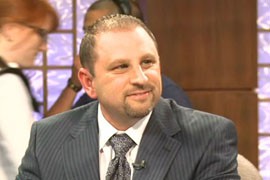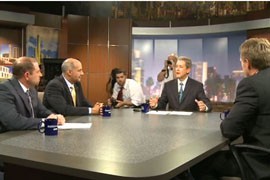Cronkite News has moved to a new home at cronkitenews.azpbs.org. Use this site to search archives from 2011 to May 2015. You can search the new site for current stories.
Despite Arizona’s many independents, third parties still face long odds
WASHINGTON – Marc Victor’s spokesman is realistic: The Libertarian nominee does not expect to break through the high-profile Senate standoff between Republican Jeff Flake and Democrat Richard Carmona.
It’s not for lack of trying. Victor made enough noise in the first and only debate among the three men that in early October Politico dubbed him a potential spoiler in the race.
But with limited resources – the Arizona Libertarian Party reported spending just $1 on campaigns since August – there is only so much a third-party candidate can do in a large state.
“We aren’t able to reach everybody in the state,” said Mike Wasdin, Victor’s campaign spokesman. “There’s too much area to cover. There are people who aren’t going to know about Marc.”
While registered Libertarians make up less than 1 percent of Arizona’s 3.2 million registered voters, independents make up 32 percent – seemingly fertile ground for alternatives to the top two parties.
But recent polls indicate that only about 3 percent of Arizonans are planning to vote for someone other than Carmona or Flake, who reportedly holds a slight lead.
Wasdin thinks 3 percent is low, but said the poll results are no surprise.
“I’ve received calls with automated polls: ‘Press one for Jeff Flake. Press two for Richard Carmona. Press three for other,’” Wasdin said. “When you press three, it just goes on to the next question.”
Part of the challenge of establishing a statewide identity is money. Flake and Carmona had raised $7.5 million and $5.5 million, respectively, as of mid-October, according to the Federal Election Commission. Victor’s campaign – $7,500.
But Carla Howell, executive director of the National Libertarian Party, said even if a candidate raises large sums, media recognition remains the linchpin.
“You can raise all the money you want, but if the media refuses to cover you, you aren’t going to get the name recognition,” Howell said.
Victor’s only media boost came Oct. 10 in a televised debate alongside Flake and Carmona. When the debate seemed built for two, Victor jumped in.
“People from across the nation were contacting us after the first debate because it was on C-SPAN,” Victor said.
“You saw me talking about big issues – what departments I would cut … the drug war, the wars overseas,” he said. “They (Flake and Carmona) were wanting to talk about all sorts of ridiculous things.
“I would pound my hand on the table and mention the budget. It was met with silence. I raised the Afghanistan war – silence,” said Victor, who said he was not invited back for the second and third debates.
Howell called that an “automatic momentum-killer.”
“When they do allow Libertarians in the debates, they’ll often leave them out in the final debate, sending the signal that there are only two choices,” Howell said.
Wasdin still thinks that Victor will garner more votes than polls indicate, maybe as high as 7 percent. But Kim Fridkin, an Arizona State University political science professor, finds that unlikely with only about 22,000 Libertarians registered in the state.
“I don’t think there’s enough publicity to have an effect,” Fridkin said. “If it were 30 votes to decide the winner, it would be a different story.”








